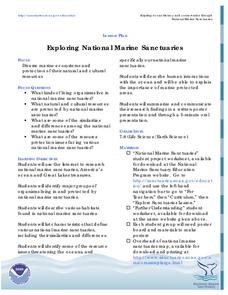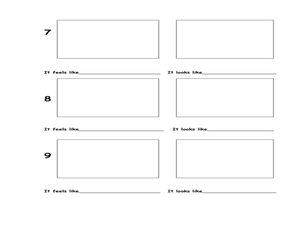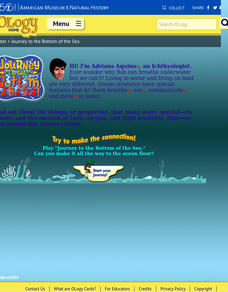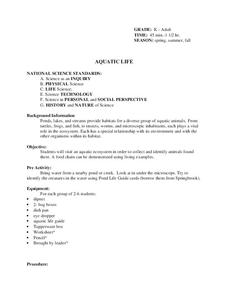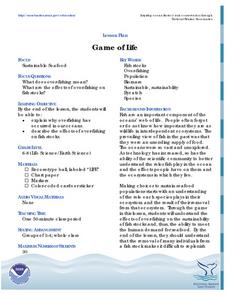Curated OER
Turning the Tide on Trash: Marine Debris Curriculum
Seven pages of fascinating reading on marine debris preface the activities in this lesson plan. Four different activities are employed to simulate how the debris is distributed in the ocean and along beaches. Early ecology learners...
Curated OER
Marine Debris
Now is the time to educate tomorrow's citizens to care for the planet, and here is a lesson to help facilitate the process. Collect some marine debris and bring it into class. Have your class separate it into types and then test each...
Curated OER
Marine Debris
Students perform experiments to examine if debris float, or blow in the wind. The effects of these characteristics on the marine debris are then discussed. They determine how a material can influence what becomes marine debris.
NOAA
Marine Policy
Save the oceans! The 22nd installment of a 23-part NOAA Enrichment in Marine sciences and Oceanography (NEMO) program focuses on laws and marine policy. Pupils take part in an activity investigating fisheries stock data.
Curated OER
Exploring National Marine Sanctuaries
Learners research marine ecosystems by creating class presentations. In this oceanography instructional activity, students research the different locations of marine sanctuaries by identifying them on a transparency map in class....
Nature Works Everywhere
Sharks and Shorelines
Examine predator-prey marine relationships through an interactive lesson design. Learners begin by studying a specific shark species and then analyze real-time shark-tracking data. They also study threats to shark populations and...
Curated OER
Exploring Marine Objects
Students identify the sources of water on Earth. In this life science lesson, students list the different plants and animals that live in the ocean. They explore marine objects in the lab and draw them.
Curated OER
Marine Debris
Students will perform experiments to examine if debris will float, or blow in the wind. They discuss the effects of these characteristics on marine debris.
American Museum of Natural History
Journey to the Bottom of the Sea
Properties of water make it essential for the life of marine species. Learners complete an online game to answer questions about the role water fulfills for organisms in ocean habitats. The game emphasizes the properties of water and how...
Curated OER
Introduction to Coral Reefs
Students identify locations of coral reefs, both in the water and around the globe, identify relative depth of corals in the ocean by observing behavior of cold and warm saltwater, and create models of coral reefs.
Curated OER
Beach Cleanup at a Local Beach
Students participate in an environmental clean-up activity. In this environmental lesson, students travel to a local beach. Working in small teams, students collect trash from the local beach. Returning to school, students sort the trash...
Curated OER
Phytoplankton and Ocean Color
Fifth graders identify function of phytoplankton in the biospere by conducting experiments and simulations and reading for information. They detect the presence of phytoplankton in bodies of water by examining ocean in satellite images...
Curated OER
Marine & Aquatic Habitats Activities - Tidal Pools
Young scholars analyze the survival needs of different organisms and the conditions in a particular area that can affect these survival rates.
Curated OER
Monitor Marine Migrants
Students, in groups, track the seasonal journey of a species, such as a shorebird, sea turtle, or marine mammal, using various sources of migration data
Curated OER
Aquatic Life
Students explore aquatic life. In this science lesson, students visit an aquatic ecosystem and collect animals found there. Students create a food chain for the aquatic ecosystem.
Curated OER
Marine & Aquatic Habitats Activities - Walk in the Wetlands
Students research various types of fresh water wetlands and identify the common animal and plant life in these different ecosystems. They further analyze the need to protect these wetlands and explore their varied uses.
Curated OER
Using Abiotic and Biotic Parameters to Monitor Air Quality
Learners identify the abiotic factors that influence a river or stream and the organisms that live in it. They measure several abiotic and biotic parameters to gauge water quality. Students examine the biotic environment by identifying...
Curated OER
In the Company of Whales
Students examine whales and how they migrate. In this whale lesson students research whales and their migration patterns.
Alabama Learning Exchange
WATER You Doing to Help?
Auntie Litter is here to educate young scholars about water pollution and environmental stewardship! Although the 15-minute video clip is cheesy, it's an engaging look at the water cycle and conservation. Learners start by illustrating...
Curated OER
Game of Life
By playing this game, students discover what happens to a fish stock when large amounts disappear.
Curated OER
Mud in the Water
Learners build a soil erosion model to study the importance of soil conservation. They investigate how land forms from both constructive and destructive forces.
Curated OER
Air Pollution
Students seek solutions to environmental problems. They discover how to conserve and protect natural resources. They examine the role of acid rain on plants and discover how to filter pollutants.
Curated OER
Utilizing Community Resources
Young scholars gain an understanding of scientific methods and use process skills (such as observing, classifying, and predicting) to solve a problem. They develop an understanding of the need for natural preservation.
Society of Petroleum Engineers
Renewable and Nonrenewable Energy
Energize an environmental science unit on natural resources with this collection of instructional materials. From simple coloring sheets for primary grade children, to guiding questions for a high school research report, a wide variety...






